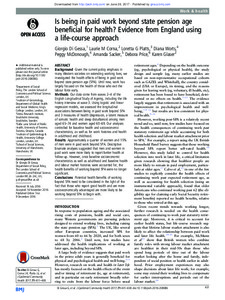Is being in paid work beyond state pension age beneficial for health? Evidence from England using a life-course approach

Di Gessa, Giorgio ; Corna, Laurie M. ; Platts, Loretta G. ; McDonough, Peggy ; Sacker, Amanda ; Price, Debora ; Glaser, Karen
Journal of Epidemiology and Community Health
2017
71
5
431-438
older worker ; retirement age ; health status
Older people
http://dx.doi.org/10.1136/jech-2016-208086
English
Bibliogr.
"Background
Given the current policy emphasis in many Western societies on extending working lives, we investigated the health effects of being in paid work beyond state pension age (SPA). Until now, work has largely focused on the health of those who exit the labour force early.
Methods
Our data come from waves 2–4 of the English Longitudinal Study of Ageing, including the life history interview at wave 3. Using logistic and linear regression models, we assessed the longitudinal associations between being in paid work beyond SPA and 3 measures of health (depression, a latent measure of somatic health and sleep disturbance) among men aged 65–74 and women aged 60–69. Our analyses controlled for baseline health and socioeconomic characteristics, as well as for work histories and health in adulthood and childhood.
Results
Approximately a quarter of women and 15% of men were in paid work beyond SPA. Descriptive bivariate analyses suggested that men and women in paid work were more likely to report better health at follow-up. However, once baseline socioeconomic characteristics as well as adulthood and baseline health and labour market histories were accounted for, the health benefits of working beyond SPA were no longer significant.
Conclusions
Potential health benefits of working beyond SPA need to be considered in the light of the fact that those who report good health and are more socioeconomically advantaged are more likely to be working beyond SPA to begin with."
Digital
The ETUI is co-funded by the European Union. Views and opinions expressed are however those of the author(s) only and do not necessarily reflect those of the European Union or the ETUI.